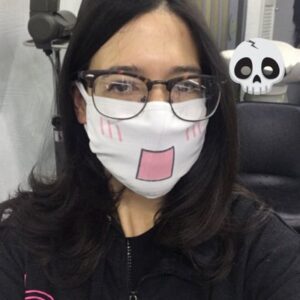Poets of the Dark: Interview with Tania Chen
 Tania Chen is a Chinese-Mexican queer writer of living nightmares. Their work was selected for Brave New Weird Anthology by Tenebrous Press, and has also appeared in Unfettered Hexes by Neon Hemlock, Apparition Lit, Strange Horizons, Pleiades Magazine, Baffling Magazine, Longleaf Review, The Dread Machine among others. They are a graduate of the Clarion West Novella Bootcamp workshop of 2021 and a recipient of the HWA’s Dark Poetry Scholarship. Currently, they are assistant editor at Uncanny Magazine and can be found on twitter@archistratego or mastodon at @archistratego@wandering.shop
Tania Chen is a Chinese-Mexican queer writer of living nightmares. Their work was selected for Brave New Weird Anthology by Tenebrous Press, and has also appeared in Unfettered Hexes by Neon Hemlock, Apparition Lit, Strange Horizons, Pleiades Magazine, Baffling Magazine, Longleaf Review, The Dread Machine among others. They are a graduate of the Clarion West Novella Bootcamp workshop of 2021 and a recipient of the HWA’s Dark Poetry Scholarship. Currently, they are assistant editor at Uncanny Magazine and can be found on twitter@archistratego or mastodon at @archistratego@wandering.shop
What sparked your interest in horror poetry? Was there a particular event or work that inspired you to delve into the darker side of poetry?
I’ve always loved horror in all of its forms. One of the first bedtime stories read to me was “The Monkey’s Paw” and “Hoichi the Earless”, so it was only downhill (or uphill?) from there. Without being too conscious of it, I always drifted towards darker works of poetry or sought out the darkness within the classics: Keats’ Odes, Poe’s “The City in the Sea”, William Blake’s “The Tyger”, to cite a few.
But what drove me to write horror poetry in particular, initially as a hobby and outlet for myself, was British playwright Sarah Kane’s works. While she wrote plays, most of her works–to me–read as long poems. In particular “4.48 Psychosis” is a heart wrenching, frightening journey. I wanted to write something that visceral that would stick with others the way this particular play stuck with me.
Can you describe your creative process when writing horror poetry? Do you have any rituals or techniques that help you tap into your darkest fears and bring them to life on the page?
Most of the time I start with an image I want to put down in words, then the rest of the poem resettles around that. These images are things I dreamt of or just witnessed walking down the street. And they usually start out as very benign until the rest of the poem takes shape.
Sometimes the horror never really comes to the forefront of the poem, just remains in the background and taps you on the shoulder during revision to remind you to bring it forward. Not sure I’m always very successful with this part!
How do you balance the need to be evocative and disturbing with the constraints of poetic structure and form? Are there any particular strategies you use to create tension and build suspense in your horror poems?
I try not to worry too much about form but rather try to let it breathe a little. Following strict forms can be as effective as not, so my main focus is always geared towards the images and vibe I am trying to convey.
Once I have the images I want then the structure usually feels self-evident. I’m very biassed for prose-poetry as a starting point for structure though.
Who are some of your favorite horror poetry inspirations? Are there any authors or poets whose work you admire and draw inspiration from when crafting your own dark verse?
There are a lot, and I’m always scouring Nightmare Magazine, Uncanny, Strange Horizons and the Dread Machine for new poems and poets. Of particular recent inspiration are Elizabeth Bear’s “Hel on a Headland(https://www.uncannymagazine.com/article/hel-on-a-headland/)” and “Walls, Stars, Eyes, Walls(https://www.thedreadmachine.com/walls-stars-eyes-walls/)” by Jason Kahler.
I’m also a really big fan of Christina Sng and Avra Margariti. They both have such a lyrical, smooth, haunting way of writing, it’s incredible.
Finally, what advice would you give to aspiring horror poets who want to explore the genre? Are there any particular challenges or pitfalls they should be aware of, and how can they overcome them to create truly terrifying poetry?
My advice is always to start by reading what is out there, that helps both inspiration and finding your own goals, and to not worry if what you write doesn’t scare you. That held me back for a long time until I started getting feedback that some things I was writing were terrifying, just not to me because I was too busy crafting them.
Ultimately, just write what you feel resonates with you the most, and treat yourself after rejections. It is easy to get discouraged, so don’t let rejections hold you back either. As of writing this, I’m knee-deep in them and ready to treat myself to a slice of chocolate cake. Putting your work out there is hard and scary, so be kind to yourself and everyone around you.



